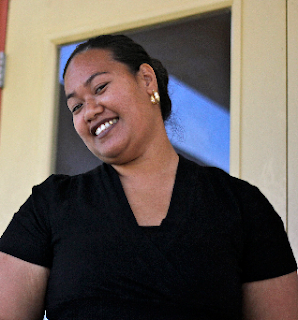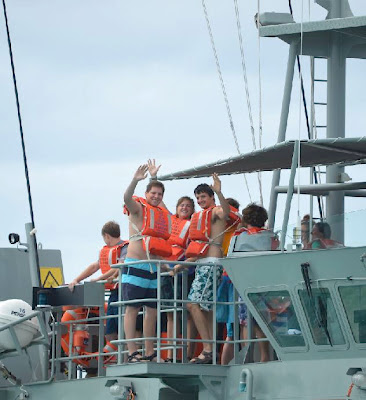I should let you know. I moved to a small village. It's called Fatumu and it rocks.
Sundays in Tongan culture are a
day full of lotu, kai, mohe and eva pe. (church, food, sleep and walking
around). Not a single shop is open. Like my host mom Una says, “it is a day of
Thanksgiving.” Tongans eat like it’s Thanksgiving, too. Every Sunday. I think
I can get use to this.
Before I tell you more about
Sunday, I should probably fill you in on the last few days. On Saturday all of
the Peace Corps Trainees hopped into a Peace Corps van to head to our homestays.
For the next 2 months we will be living and learning in tiny villages located
on the eastern part of Tongatapu.
I moved to a little village
called Fatumu. I, along with my friends Alissa and Mark (a totally awesome
married couple that are also PCTs), can now call Fatumu our home. Fatumu consists
of 4 churches, 5 falekoloas (shops), and 2 roads. Mark and Alissa and I live
about 3 minutes apart from each other. If you are standing anywhere in the
village you can usually hear the crashing of the waves on the beach. That is
how close we are to the Pacific Ocean.
If you are staying in Fatumu you
will always wake up to the sound of one (or more) of the following:
1) Roosters
– Somewhere in my life I learned that the rooster only crows once a day – alerting
you that it’s time to get up. Let me tell you something: fairy tale books? The
authors of all of them are a bunch of liars. This is just not true. They keep
cockadoodleedoing all morning long. All
morning long.
2) Puaka
(pigs) – This is my favorite way to get woken up. The snorting of the pig
outside of your window. They make such funny noises.
3) Kuli
(dogs) – This is my least favorite way to wake up. The dogs sound like they are
killing each other. There is so much barking, yipping and crying.
4) Church
bells – Monday, Wednesday, Friday, and Sunday the bells to one (or all) of the
churches in town alert you to the new day. My bedroom window is about 20 feet
away from the nearest church. Ringa-ding-dong.
Many of the men in the village
work in the bush. Some women work
in town (at the falekoloas) or at home, while others take the bus to
Nuku’alofa.
My host mother’s name is Una. She
is a 21-year-old (yep, you read that
right her adopted daughter – me, is a whopping 7 years older) and has lived
in Fatumu her entire life. She lives with her grandparents, half brother and a
little girl named Sala (still trying to figure out how she’s related).
After church we all came back to
the house and ate food cooked in the ‘umu (underground oven). We had loo –
meat, onions and coconut crème baked in taro leaves and then wrapped in banana
leaves. We roasted a pig, ate sweet potatoes and finished with Tongan ice cream
(papaya cooked in coconut crème). It was delicious.

















































